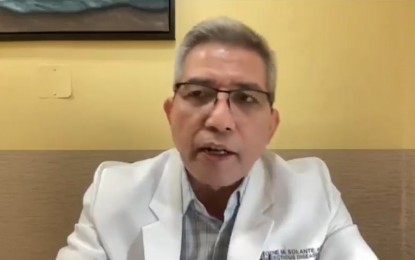
Philippine College of Physicians president Dr. Rontegene Solante (Screengrab from Laging Handa public briefing)
MANILA – Cases of water-borne and vector-borne diseases may increase nationwide as the country experiences El Niño, an infectious disease expert said Tuesday.
Philippine College of Physicians president Dr. Rontegene Solante said in a televised Laging Handa public briefing that tropical countries are susceptible to water-borne diseases year-round.
“Pwede pa madagdagan ‘to, tagtuyo, El Niño, nakukuha yan sa contaminated water (The cases may increase during El Niño, and you get that from contaminated water),” Solante said.
Among the common diseases are typhoid fever, which is caused by salmonella bacterial; and shigellosis characterized by belly pain, fever, and watery or bloody diarrhea, caused by the shigella bacteria, both usually caused by not washing hands.
Meantime, drinking contaminated water may cause abdominal pains, fever, diarrhea, hepatitis A, amoebiasis and cholera, Solante said.
He said non-specific viral infections caused by rotavirus and norovirus are also common among young children, both of which cause diarrhea and vomiting.
Apart from storing clean water properly, he reminded the public to observe handwashing before eating meals.
“Kung bumibili naman ng mga pagkain sa labas, kelangan siguruhin na ‘yung nagluluto at pagluto ay malinis (If you’re buying prepared meals, make sure that the food is cooked and handled in a clean manner),” he said.
Vector-borne diseases, or illnesses carried by mosquitoes, like malaria and dengue, also abound during El Niño season.
Mosquitoes may also initiate dengue, zika infection, and chikugunya.
“Among Asian countries, tayo ‘yung pangatlo na pinakamataas this year at medyo tumataas rin ang mortality (we’re third on the list of countries with highest cases this year, and the mortality rate is also increasing),” he said.
The rise of temperature during El Niño alters the ecology of mosquitoes, making them move or travel places, while increased mobility of the population causes more to be vulnerable to infections. (PNA)
